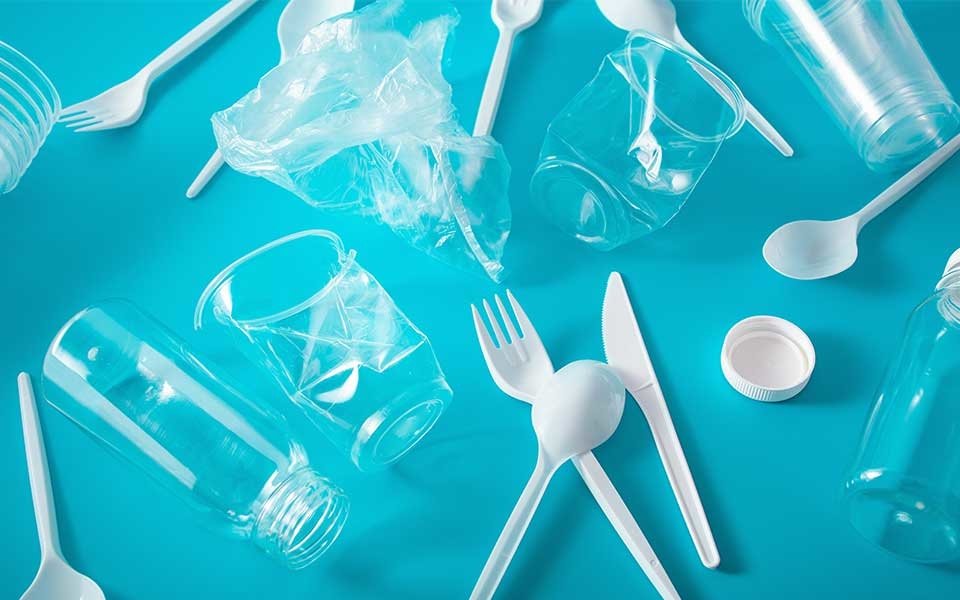THE CASH COW OF A GLOBAL PANDEMIC: SINGLE-USE MATERIAL ITEMS
By Carys Hopkins
Currently the world is fighting a global pandemic (Covid-19). It is just one of the effects of climate change that we are facing. Other effects are ‘natural’ disasters, which have become normalised and accepted as part of the planet’s natural weather patterns. These however are becoming more frequent and more deadly. Sea levels have risen, global temperatures have increased, and - as we are currently experiencing - global pandemics are becoming more frequent with smaller intervals.
During the current Covid-19 pandemic the usage of single use items and plastic has increased dramatically. This has all been in the name of hygiene. I appreciate this factor, yet it doesn’t sit right with me. I find this an excuse or at the very least an incredibly poor effort from the general population’s acceptance of it. This will inevitably reverse the positive impact that the global population have had in reducing their single usage items over the recent years. It begs the question of why? And how? Complacency to the destruction of the planet in the name of capital gain has to end.
The economy has faced serious problems during the pandemic, many industries have been completely shut down and businesses have closed. The fossil fuel industry has found it has been able to get support from governments globally during the pandemic. The G20 countries have subsidised $293.10 billion to the fossil fuel industry since early 2020. This emphasises how governments are using this collective economy to support an industry that is harming the planet and people. The influence the fossil fuel industry has over governments across the globe is deeply saddening. It is despicable to see how world leaders are using policies, to enable a few capitalist individuals, to increase their hoards of wealth in the name of saving the global economy.
Whilst fossil fuel sales have decreased, and have been decreasing pre Covid-19. The recent decrease was as a result of reduction in travel. The fossil fuel industry has carefully curated the idea that they are an essential part of the global economy for decades, through propaganda and deception. By subsidising fossil fuel companies they therefore are fuelling climate change, using taxpayers money to do so. In December 2020 the UK government announced its plans to stop subsidies to fossil fuel companies overseas. However, they neglected to release many details for their plans to end subsidies to companies within the UK. While the UK government is still part of the G20 it appears subsidies will continue through this channel instead.
“A 2019 report found that plastic emissions had risen by 15% from 2012 to 2018. ”
The only industry to benefit from the pandemic is oil and gas, within this industry is plastics. Investment into petrochemicals over the recent years has boomed. Companies are now rolling in the benefits, like pigs in mud. Investment significantly increased again during the first few months of the global pandemic in 2020. Petrochemicals use fossil fuels to produce plastics. There are impacts on the climate at every stage of the process. Such impacts are the release of CO2 into the atmosphere, the release of harmful toxins into the atmosphere and the ground, and plastic products are dumped all over the planet. A 2019 report found that plastic emissions had risen by 15% from 2012 to 2018. This report from the Center for International Environment Law demonstrates how the pre Covid-19 plastics sector was operating. The rise in emissions is drastic, given the agreed upon goals to achieve reduction of fossil fuel usage and a reduction in plastic manufacturing.
According to The British Plastics Industry, the plastic industry in the UK has an annual sales turnover of about £27 Billion. There is a clear expansion of the industry with a growing workforce and a continued growth in production. This is despite the global aim to reduce plastic production and usage. Pre Covid-19 approximately 1% of PPE was manufactured in the UK. However, by December 2020 it was estimated that 70% of PPE was manufactured domestically. This is an obnoxious growth. A 70% increase of manufacturing of single use plastic items is disgusting.
Scandals about the UK government’s bungling of the PPE contracts have been raised to the public's attention in the recent months. The lack of connection between any of the statistics and information is astonishing. There’s no doubt that the full details of the crimes the UK government have committed surrounding the PPE contracts will soon come to light. Between 2019-2021 the government spent £9.9 billion on the procurement of single use material items (PPE). Most of the PPE sourced from the contracts came from abroad and was also manufactured abroad. Given the figures of PPE manufacturing in the uk, compared to information in the PPE contracts, the information at hand is inherently conflicting.
Plastics aren't just bad for the environment, in regards to the damage they cause or their longevity. They are made as a byproduct of fossil fuels (crude oil, coal, natural gas), and are manufactured and sold by fossil fuel companies. These are the same people who have knowingly perpetuated climate change for decades. Companies have lied to the public about the knowledge they had, on the harms of fossil fuels. This is the most ruthless industry with the most cold hearted detached individuals. There's no justification for their business methods or their perpetuating of climate change.
Supermarkets have been part of the campaign for years to reduce their single use materials in stores. But have returned to their old ways in the name of health and safety. It feels like oil companies are trolling us. We must put pressure back on the supermarkets, to cut their ties once again with single use material items. How can there be a global effort to ban plastic bags in some instances, place a charge for them in others as a deterrent, but we are unable to commit to banning them all together? They must create new innovative alternatives, for the planet and for the health of the people.
The usage of single use material items in healthcare on average is incredibly high, it is currently being consumed at an unheard of rate. There are countless opportunities for innovative scientists to create new technologies that are better for the environment compared to plastics. They must show up for the future of the planet.
We are told to cut the ties of single use masks to help protect sea life once the masks end up in our oceans. That isn't good enough. We are making a conscious effort to cut the strings, but then what? We have accepted that the masks will still end up in our oceans. We are complacent to pollution but it is justified as we cut the strings. The current data is changing daily, however it has been estimated that approximately 3.4 billion single use items are discarded daily.
“3.4 billion single use items are discarded daily”
During research I came across The Global Plastic Action Partnership. Some notable sponsors are Pepsico, Nestle, Coca-Cola, DOW, Morgan Stanley and Unilever. All of whom are part of the governing council and steering board, as well as a member of the World bank. All named entities are opposed to measures that would limit the effects of climate change, that protect the health of the global population, that would see a reduction in fossil fuel sourcing and burning, and that would see a reduction in plastic production and usage. This blatant example of corruption is just one example of many hundreds if not thousands of others that go on daily. This is the problem. Big businesses are using the power of their wealth to exploit the planet and people.
We must recommit to plastic reduction, governments must use their powers to ensure legislation is in place with the aim to reduce plastic production and usage of fossil fuels. We are yet to see a real commitment from people in power to save the planet and people. We need a universal innovative waste reduction management plan that aims toward sustainability and uses a circular approach. It is imperative we act now, our planet is dying and our people are dying.
Resources:
https://www.sciencedirect.com/science/article/pii/S2405844021004485
https://www.sciencedirect.com/science/article/pii/S0160412015300489#bb0415
https://www.tussell.com/insights
https://www.motherjones.com/environment/2020/03/your-plastic-addiction-is-bankrolling-big-oil/







